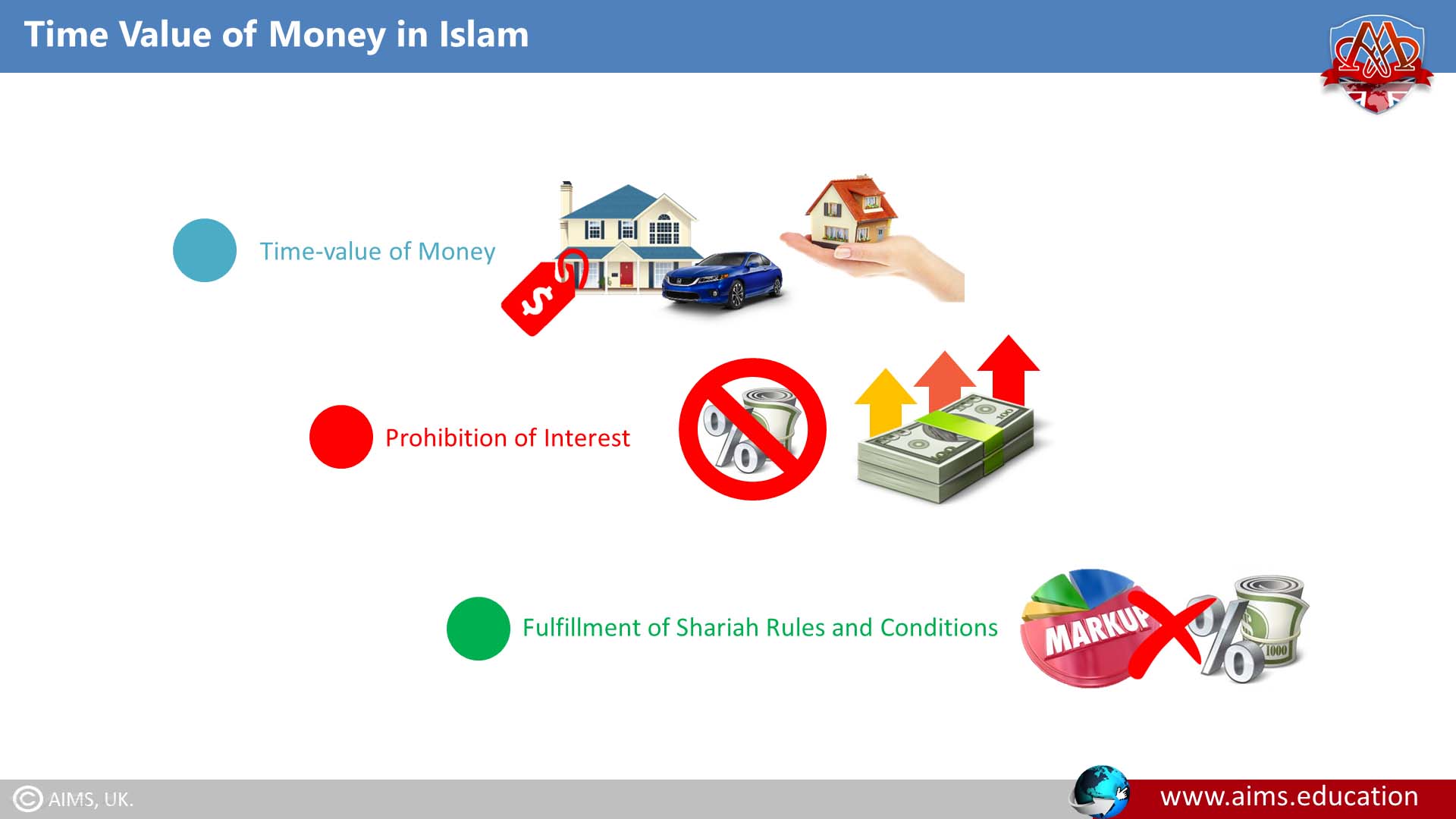Time Value of Money in Islam
The time value of money is a fundamental principle of conventional finance, however, there is no concept of the time value of money in Islamic finance as it leads to riba. Islamic Shariah does not recognize the value of money in any type of rescheduling of the debts for more profits. Once a sale is mutually agreed between the parties, any addition of money to this price due to delay is prohibited in Islamic Shariah and haram. This is because the commodity once sold even on credit, belongs to the purchaser, and the seller has no right to re-price it. Any addition to its price is considered a riba or interest.
Concept of Time Value of Money in Islamic Islam
The time value of money in Islam and, in general, is about earning interest or investment returns over time to maximize resources. In Islamic finance, time value of money is acceptable as long as it is Shariah compliant, and doesn’t include prohibited elements like interest (riba) and excessive risk-taking or maisir (ميسر or gambling or games of chances).
Time Value of Money Examples
The perspective of the time value of money in Islamic finance should not be mixed with the concept of charged fees while practicing Islamic modes of financing. That is a completely different concept, and it is explained below with the help of the two examples:
1. Price of Commodity
The increase in price of commodity in the original transaction is because of deferred payment, which is a valid sale. As it could be seen in Murabahah or مرابحة contract.
2. Future Delivery of Goods
Salam (بيع سلم) as a forward contract, enables payment in advance for future delivery of the goods, which is genuinely less than the cash-n-carry price.
CAUTIONS IN ISLAMIC BANKING AND FINANCE PRACTICES
- The time value of money in Islamic finance is acceptable concerning the pricing of assets and their usufruct.
- In Islam, interest or riba is prohibited due to being increased over any loan or debt.
- Charging extra money in Murabahah is subject to fulfillment of Sharia rules and conditions. However, the mark-up technique should NOT be used as a backdoor for allowing Riba. Due to the nature of Murabahah and its similarities with conventional loans, it is not a preferred financial instrument by most Shariah Scholars.
Settlement of Debts and Currency Rate Fluctuation
According to principles of Islamic finance and banking, when financial contribution takes the form of a Halal/Islamic loan or a debt, it is to be paid back exactly in the same kind and quantity, irrespective of any change in the value of currency, or price of commodity lent or borrowed. This principle is applicable on:
- Loans,
- Debts,
- Credit,
- Barter,
- Deferred exchange of currency,
- Indemnity,
- Change in the unit of currency, and
- Delayed payment of remuneration after devaluation or revaluation.
However, if currency of the debt becomes extinct not available, its counter value will be paid, and rate of due date will be applicable.

Time Value of Money in Islamic Finance VS Conventional Finance: Key Differences
The time value of money in Islam is based on the core principles of Islamic economics that foster social justice and equitable distribution of resources.
Here are a few differences in the concepts of the time value of money in Islamic finance when compared to conventional finance:
- Conventional financial systems heavily rely on interest-based transactions, whereas Islamic finance strictly forbids any type of riba.
- Islamic banking and financial system promotes Shariah compliant profit-sharing arrangements and risk management according to Islamic concepts, which ensure that all parties involved in a transaction share the gains and losses equally.

OIC Fiqh Academy Rules Regarding Time Value of Money in Islam
In the 5th Session of OIC Fiqh Academy, it was concluded that:
“Significantly, fixed debt is repaid in its own currency, and not by its counter value, because debts are settled in the same currency. Thus, it is not permitted to attach fixed debts, whatever their source, to currency fluctuation”.
Time value of money Islamic perspective, on the 8th session of the Fiqh Academy approved the following:
- The creditor and debtor may agree on the day of settlement, but not before, to the settlement of the debt in a currency other than the one specified for the debt, provided the rate of exchange applied is that applicable on the settlement date.
- Similarly, for debts due in installments in a specific currency, the parties may agree on the day of settlement of any installment to have it effected in full in a different currency, at the prevailing rate of exchange, on the date of settlement.
- A conditional requirement in all cases is that, no part of the amount subject of the currency exchange, should remain outstanding, as required under Shariah rules of exchange of currencies.
- The two parties to the contract may, at the time of contracting, agree to the settlement of the deferred cost or salary in a specific currency to be settled in single payment, or in installments in a variety of currencies or against a given amount of gold the settlement may also be made.
- A debt contracted in a specific currency, should not be recorded against the debtor in its counter value in gold or other currencies. This is because such practice would make it compulsory to the debtor, to settle the debt in gold or the other currency, as agreed upon for the settlement.
Note: The above topic, “Time value of money in Islamic finance,” is covered in detail in the online Islamic banking courses and Islamic finance and banking MBA masters degree, which are offered by AIMS’ Institute for Islamic Banking and Finance. If you wish to understand fundamental concepts of Islamic banking and finance, such as differences between Islamic and conventional finance, Gharar (غرر, uncertainty, hazard, chance or risk), Maysir (gambling, يسر or قمار qimar), see our free online lectures on Islamic banking and finance.

Conclusion
Regarding the time value of money in Islamic finance, it may be concluded that:
- Time value of money in Islam is acceptable in respect of the pricing of assets and their usufruct.
- Interest is prohibited due to being increase over any loan or debt.
- Murabahah is subject to fulfillment of Shariah rules and conditions; however, the mark-up technique should not be used as a backdoor for allowing interest.
Frequently Asked Questions
Q1: What does “time value of money in Islamic finance” actually allow?
It allows different pricing over time for real assets (sales/leases). It does not allow adding charges to loans for delay, which would be riba.
Q2: Why isn’t the time value of money in Islam the same as interest?
Islam links returns to risk and real trade. A time-linked increment on a pure loan is riba, while a higher deferred sale price reflects contract terms for an asset.
Q3: How does Murabahah apply the concept of money in Islamic banking without riba?
The bank sells a real asset at cost-plus profit (possibly higher for deferred payment). Proper Sharia execution prevents it from mimicking an interest-based loan.
Q4: Can you discuss the concept of money in Islamic finance regarding currency fluctuation?
Debts are repaid in the same currency and amount. On settlement day, parties may agree to convert at the prevailing rate, completing exchange on the spot.
Q5: When is a higher deferred price permissible?
Only if set at the time of a valid sale or lease. Increasing an existing debt due to delay is prohibited as riba.
Q6: What examples illustrate the time value of money in Islamic finance?
Murabahah allows higher deferred price in a sale; Salam allows advance payment for future delivery at a lower price than spot.
Q7: How are loans and credit treated when currencies change value?
They’re repaid in the same kind and quantity. If the currency is unavailable, pay the counter value at the settlement date; no debt indexation to gold or other currency.
Q8: What cautions apply to extensive use of Murabahah?
Ensure true purchase, ownership, and risk by the financier. Avoid shortcuts that turn it into a disguised interest charge.
Q9: How do profit-sharing contracts relate to the concept of money in Islamic finance?
They tie returns to enterprise and risk, not to time alone. Profits are shared by ratio; losses follow capital contribution unless due to negligence.
Q10: Where can I find a concise overview or video lectures on this topic?
See AIMS Education’s study notes and time value of money video lectures that contrast permissible deferred pricing with prohibited interest on loans.
